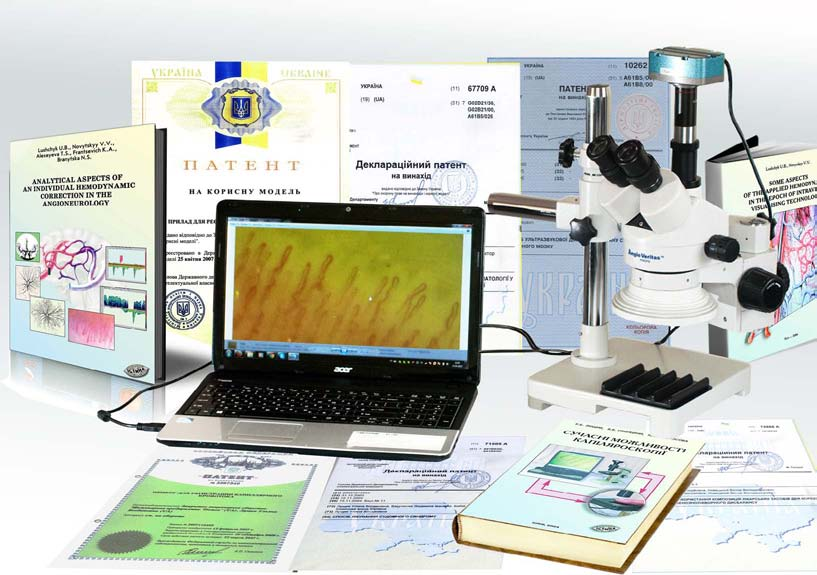Subtechnologies

BIOMARKERS OF NEOANGIOGENESIS as “ONCO-CAPILLARIES
Application: family doctors, oncologist, urologist, gynecologist.
Benefits: the subtechnology offers an innovative approach to the cancer diagnosis and, importantly, it is an effective tool in the onco-screening, future monitoring of disease conditions of the onco-patients and the disease’s progress at the different stages of cancer pathology.
This technology allows diagnosing onco-diseases in the early stages and can be the basis of state compliance program for early detection of cancer.
CONGENITAL MALFORMATIONS OF VESSELS
Application: obstetric, neonatal, pediatric and genetic departments.
Benefits: diagnosis of congenital forms of vascular anomalies.
Normal formation of vessels is the guarantee of health of the nation and the state.
The purpose of subtehnology – diagnosis of congenital and congenital forms of vascular anomalies.
The ideology of the certification of the population – a healthy nation starts with certificated newborns and development and implementation in practice by Ministry of Health for family doctors for early detection of abnormalities – aneurysms, arteriovenous malformations aimed for stroke prevention in children and adolescents in future.
CARDIOLOGY AND CARDIAC SURGERY
Application: cardiologyy, cardiosurgery, angiosurgery, anesthesiology.
For cardiac surgery – to quickly assess the effectiveness of the operation into the operating table.
Diseases:
- Arrhythmias(abnormal heart rhythm)
- Arterial hypertension
- Heart pain
- Vegetative-vascular dystonia
- Numbness or cold feeling in extremities
- Coronary heart disease (also known as coronary artery disease and ischemic heart disease)
Benefits: the subtechnology allows monitoring changes in the patient’s state at each stage of treatment without complex diagnostic procedures.
The purpose of subtechnology – due to this subtechnology they will be able to provide immediately examination of the efficiency of heart pump function for the whole body with personalized approach.
ANGIONEUROLOGY
Application: family doctors, child and adult neurologists, angiologist
Diseases:
- Charcot-Marie amyotrophy
- Apallic syndrome (vegetative state)
- Arachnoiditis
- Autism
- Vomiting
- Vegetative-vascular dystonia
- Hydrocephalus
- Hyperkinesis
- Hypothalamic syndrome
- Headache
- Degenerative diseases of the spine
- Dementia, Alzheimer’s disease
- Discogenic polyneuropathy
- Epilepsy
- Fainting
- Memory worsening
- Stroke
- Brain haemorrhage
- Leukodystrophy
- Meteosensitivity
- Microcephaly
- Mononeuropathies
- Migraine
- Mucopolysaccharidosis
- Narcolepsy
- Neuralgia
- Neuroinfection
- Neuropathy of a trigeminal nerve
- Neuropathy of a facial nerve
- Ophthalmoplegia
- Perinatal encephalopathy
- Plexopathy
- Polyneuropathy
- Speech disorder
- Post-traumatic syndrome
- Progressive muscular dystrophy
- Radiculitis
- Multiple sclerosis
- Chronic fatigue syndrome (the article “What is the Chronic Fatigue Syndrome?”)
- Syringomyelia
- Somnolence
- Subarachnoid haemorrhage
- Seizures
- Tremor
- Parkinson’s Disease
- Chorea
- Cerebrovascular diseases
- Craniocerebral injury
Benefits: find vascular pathology at the pre-clinical stage and prescribe personalized appropriate treatment, a neurologist may withdraw completely from strokes statistics among their patients. Pathology of vessels may develop 2-3 years before having a stroke. Vascular screening is an indicator of troubles in human vascular system and the brain in particular.
Ideology: Pathology vessels develop 2-3 years before having a stroke. Vascular screening is an indicator of trouble of all organism of vascular and brain in particular.
Today, in the world diseases like stroke and myocardia strike younger population, this leads increase in the mortality rate on 40% (stroke). And we require some modern diagnostic tools that would allow a comprehensive vision of the problem in minutes, which reduces budgets for rehabilitation at clinics after vascular accidents.
VASCULAR ABNORMALITIES IN PSYCHIATRIC PRACTICE
Application: for cases like depression, epilepsy, dementia, sleep disorders, phobias and so on.
Diseases:
- Insomnia / Sleep Disorders
- Timidity
- Depression
- Emotional lability (instability)
- Stuttering
- Neurosis-like state and asthenic-neurotic syndromes
- Urinary incontinence (enuresis)
- Depressed mood
- Irritability
- Fears and Phobias
- Tics
- Encephalasthenia
Benefits: early detection of abnormal conditions of brain vessels.
The purpose of this subtechnology – early detection of abnormal conditions of brain blood vessels.
Ideology: Patients with mental health problems almost does not have any examinations of the vascular system. Our experience has shown the correlation between vascular disorders and epilepsy, autism, psychopathy. This would allow identifying congenital or acquired vascular disorders and partially correcting them, thereby improving the quality of life of these patients.
DYNAMIC MONITORING IN ANGIOTHERAPY
Application: intensive care unit, cardiovascular, neurovascular and angiologic centers.
Diseases:
- Angiodystonia
- Anemia
- Anti-aging therapy
- Arthritis
- Osteoarthritis
- Atherosclerosis
- Joint pain
- Varicose veins
- Hypertension
- Swelling in the legs
- Nosebleeds
- Rheumatism
Benefits: fixation of necessary parameters at all stages of therapy that enables specialists dynamically react to obtained results and adjust treatment plans in accordance with patients’ needs.
REHABILITOLOGY AND BALNEOLOGY
Application: SPA-centres, rehabilitation department
Benefits: This may be like an evidence for protection of the sanatorium, spa and rehabilitation center from critical situation with patients.
Ideology: This subtechnology enables to visualize and record the patient’s condition at the “entrance to the facility,” in the course of treatment, and at discharge.
Medical law safety from complications: An important aspect of health resorts is to identify risks of vascular accidents at the start of spa treatments.
ENDOCRINOLOGY AND DERMATOLOGY
Application: diabetes mellitus, thyroid and mammary gland pathology, hypophyseal pathology, obesity, alopecia, hormonal and structural disturbances in the sexual sphere: endometriosis, fibromioma, prostate adenoma, adrenal pathology.
Diseases:
- Hypothalamic-pituitary syndrome
- Diabetes mellitus
- Diabetic angiopathy
- Diencephalic syndrome
- Climacteric syndrome
Benefits: it’s possible to correct some pathological endocrine disorders due to specific patterns.
Endocrinology problems are closely related to cardiology, oncology, ophthalmology, and other areas; this stipulates application of innovative approaches to diagnosis of a patient’s condition, namely human organism as integrated diagnostic object.
Ideology: This subteсhnology enables to examine more carefully the system dysfunction of the respective glands and to differentiate hypophyseal intersystem disorders ranging from local disorders in endocrine organs.
DENTISTRY
Application: for dentist’s therapy of periodontitis and periodontosis, temporal arteritis with the aim to save native teeth.
Benefits: adequate treatment and preservation of natural teeth due to detection of vascular disease in the blood supply for the teeth and gum.
Ideology: it is well known that the natural healthy teeth are better than artificial implant. Violation of the blood supply to the gums and the teeth leads to the development of inflammatory diseases of the gums and teeth destruction.
Nowadays, the society pays much more attention to prevention of dental disease than to radical surgical treatmentwith teeth resection and implants.
Actually this subtechnology is created for timely and complete diagnosis of microcirculation disorders in gums, which allows specialists to develop individual programs for prevention and medical treatment of periodontitis and periodontal disease.
PHARMACOLOGY
Application: vascular treatment department, intensive care department
Benefits: the visualized assessment of the patient’s state before vascular treatment and after its completion, which confirm the effectiveness of medicines. Evidence based software for treatment managements helps to create adequate treatment scheme and receive predicative successful treatment process with 100 % guaranty due to treatment monitoring management.
Ideology: This subtechnology allows getting the visualized assessment of the patient’s state before vascular treatment and after its completion, which confirm the effectiveness of medicines.
INSURANCE
Application: to determine the risk of critical conditions
Today life insurance is one of the hardest segments in the insurance industry, which is caused by high-risk because of lack of an objective assessment of the insured.
Benefits: This subtechnology in the screening mode makes it possible to assess risks of vascular events and predict possible insurance claims.
Ideology: This subtechnology allows for an integrated assessment of the adequacy and functioning of the basics of life activity of the body, namely the cardiovascular system.




